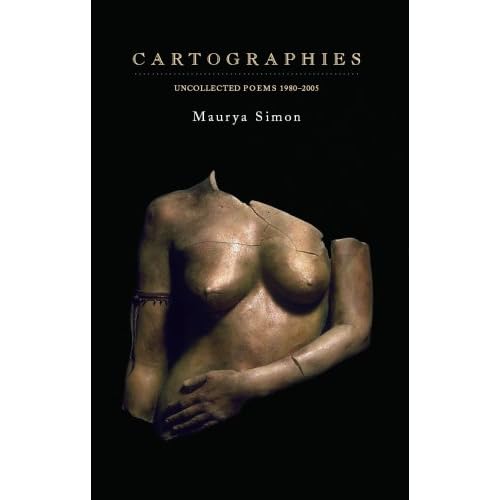Cartographies: Uncollected Poems: 1980-2005.
By Maurya Simon
(Red Hen Press).
104 pages. Paperback. $18.95, ISBN # 978-1597093873.
Reviewed by Deborah Bogen
_________________________________________________________________________________________
The cover of Cartographies is a photograph of a bronze by New Mexican sculptor, Katherine Wells. It’s a female torso with arms, but slashed across the neck and one shoulder, and missing one hand. Even so, what stays with you is the beauty and strength of the figure. This oddly broken image is the perfect introduction to Simon’s eighth book. Cartographies is laid out in four parts: The Soul, The Self, The World: Mountains, and The World: City. Simon’s poems make it clear that the maps she is intent on making in Cartographies are body-born and body-bound. They lead us deep into the poet’s life as a soul-searcher, a mother, a wife, a mountain dweller and a citizen of the larger world with its troubling truths and shifting boundaries.
Readers who are familiar with Simon’s work will not be surprised at the abundance of imaginative language and gorgeous imagery in Cartographies. In Simon’s poems “windows open and close like God’s eyelids” and butterfly wings are “a Rorschach smear/ of Spring’s delusions…”
Cartographies is also blessed with a ferocious questioning. The book opens with: “What is the soul, but the self’s lament/Sung quietly to a transparent world?” Simon wonders “Would you know a saint if you saw one?” and she wants to know if “every choice constitute a loss?” The force of these queries pushes the poet’s attention into the world of family and nature, and then into her city, Los Angeles, which stands in here for the shared arena of human activity where our ability to hurt and maim require comment from the thoughtful. This poet who loves language, who loves words, feels a little guilty about that: “Sometimes I’m ashamed of using words,/for the gold dish of the moon is more real/than the blue table I set it down on.” Still, she can’t help but notice that in the “City of Angels” “Night…is murderous.” and that even as she is able to describe Rodney King as “like Atlas burdened by the world” she must admit that he is also “Bludgeoned, coughing up blood.” Simon accepts that a poet seriously interested in metaphysical questions must become absorbed by the earthy and the physical where “The world hurts me with its questions,/with its stupid and true answers.” She knows that for spiritual musings to matter at all, they must have something to say when a friend is dying from AIDS complications, when a daughter is coming to grips with violence and evil, and when we know this truth, “I cannot save you, nor myself.”
There is, of course, much more in Simon’s book: the satisfying sound effects of “All day the day lilies stall in the shade,” the humor of her “Ars Poetrica” where a poet finds her voice by calling her sister “Sewer-slut! Scorpion shit!” and the clever mind that uses the children’s game of “Simon Says” to tell us “Simon says: Regard the mystery of nakedness,/this womanly house, this temple of bloom.” Maurya Simon is that rare bird, poet of the physical and the metaphysical as well as the territory in between: “Surely,” she says “when we look for God,/God is the look in our eyes.” and just as truly, “I could feel my soul/ Swim up madly through my marrow.”
This review first appeared in Lyric Poetry Review Number 12.
__________________________________________________________________________________________
Deborah Bogen's latest collection, Let Me Open You a Swan, is the winner of the 2009 Antivenom Prize from Elixir Press. Her earlier prize-winning books are Landscape with Silos and the chapbook Living by the Childrens Cemetery. Recent work has appeared in Poemeleon as well as New Letters, The Iowa Review, Crazyhorse, Ploughshares, Shenandoah and others. Her recent essay on the writing of Lynn Emanuel can be found online by googling "Emanuel Elegies Bogen."
